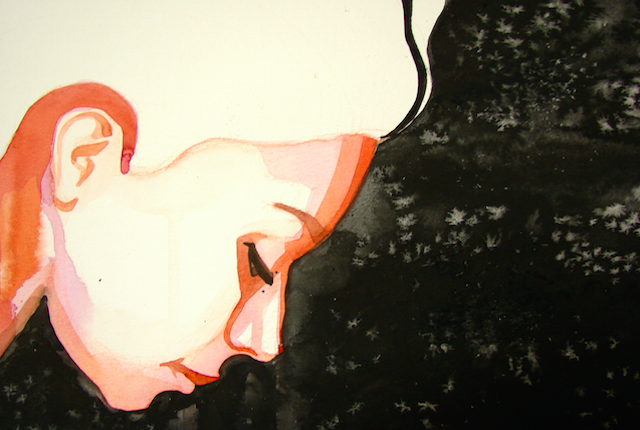
“I don’t know a perfect person. I only know flawed people who are still worth loving.” ~John Green
“I’m not good enough.”
I cannot possibly count the number of times this thought has passed through my head over the years. It’s been applicable to nearly every aspect of my life from childhood to my current status as an adult, parent, and business owner.
Still, both the frequency with which this thought enters my head and the length of time I spend believing it have dropped considerably, so I think my story and the lessons I’ve learned are worth sharing—especially since I know I’m not alone in struggling with this belief.
One of my earliest memories, if not my very first one, is of teetering on the edge of a nubby brown armchair, putting my head between my father’s downward cast eyes and whatever book it was in which he was so engrossed.
Alas, my repeated attempts to get his attention did nothing. What could a preschooler assume in this instance? Even now, more than thirty years later, I don’t see how anything other than “not good enough” or “not interesting enough” could have crossed my mind.
That was certainly not the last time my father’s behavior fed my worries that I was not enough. However, he has since passed from this world and blaming him does absolutely nothing to help me move forward; I am now an adult capable of making my own assessments of my value as a human.
In other words: I am responsible for allowing myself to feel not good enough.
But I didn’t know that for a long, long time, and I let others take me down a notch without ever questioning it.
When a boy in my gym class made a mean comment about the size of my thighs, I never questioned him; instead, I simply believed he was correct and that I should feel badly about my body.
When a close friend chose another friend over me and then, years later, a boy over me, I took the blame: obviously I was not enough. It never occurred to me that maybe she was the one with the issue.
When I got paid less than I was worth, when I my writing was rejected, when I couldn’t solve every single one of my clients’ problems, when someone unsubscribed from my mailing list, I took all of this personally. I took it as proof that I was not good enough.
Yet the years have certainly changed me for the better. In 2008 I learned that I was, in fact, in control of my thoughts. I could choose to believe or not believe the stories I was telling myself.
I also learned that everyone struggles with feeling good enough, and that I was not alone.
I learned that I could spend more time feeling good about myself if I chose to. I learned that the people who taught me I wasn’t good enough didn’t do it on purpose; they struggled with their own self-worth.
Today I am a grownup who is mostly satisfied and happy with herself and confident in her place in the world.
Yet it still creeps in. There are times, especially when it comes to motherhood and running a business, when I feel ill-equipped. When I feel the world crashing down around me, and the familiar “you’re not good enough” slithers into my thoughts, nearly undetected.
But when it does happen, I have the means to turn it around. It doesn’t own or control me anymore. Here are the basics of turning “I’m not good enough” into “I’m really okay the way I am.”
Your thoughts create your world, and you can absolutely take charge of them.
It’s impossible to overstate the importance of paying attention to what stories you’re telling yourself and learning how to change those stories into ones that best serve you.
Yes, you can spend your life repeating “I’m not good enough” over and over, but why? You can write a new script. You can also learn to let your negative thoughts float on by, like a feather in the breeze, instead of grabbing hold of them and getting sucked in.
Try telling your story a new way.
Building upon the previous point, try this exercise: Think of the most important events in your life, or a particularly trying period of your life. Write your story down the way you normally would tell it.
Next, pretend you’ve been told to write the same story, but with a humorous slant. Then write it again, this time as though you were attempting to inspire others with your tale of overcoming adversity. And again, as though you were writing about a great adventure.
The purpose of this exercise is to see how the same set of events, the events that shaped your beliefs, life, and thoughts, can take on many dimensions depending on your perception of them. Just knowing this may help you see yourself in a new light.
There is plenty of proof out there that you are good enough, you just need to look for it.
I bet you can think of a million ways you’re not good enough but struggle to list just a couple of ways in which you are. For instance, sometimes I struggle to feel like I’m interesting enough to be heard, and thus have trouble saying what I’m feeling and thinking.
To counteract that, I must take the time to list the evidence that I am, indeed, enough. I actually write down the proof in a journal, or say it out loud to my husband so that it feels concrete.
In this case, examples that I am in good enough include:
- I do my very best to be open, honest, and authentic, which I know gives my words value.
- I care deeply about others, so when I speak, I am trying my best to be supportive and helpful, which I believe makes me interesting and worthy of being heard.
- Others have asked me to tell my story, asked for my help, or just wanted to get together to talk, so I must have something worthwhile to contribute.
To try it yourself, pick one area in which you’re particularly struggling to feel like you’re enough. From there, look for any proof, any scrap of evidence, that you are. Write down every single thing you can think of, and make a regular habit of rereading the list and adding to it.
Remember that you’re not alone.
I’ve never met anyone who hasn’t, at one time or another, felt insecure about their worth or value or skills or intelligence. Somehow I find it helpful to know that even the most put-together, successful person out there struggles with the same things I do.
Reach out to others, even if it’s only in your mind.
If you have someone in your life that loves and cherishes you, why not ask for a little boost? I have gone to my husband many times when I felt down on myself, and hearing his perspective or just feeling his embrace does wonders to turn things around.
Or perhaps you’ve got no one nearby, or want to rely on yourself to feel better. In that case, try thinking about yourself from the perspective of your parent, child, best friend, sibling, or spouse.
Also, depending on your spiritual beliefs, you can try to see yourself through the eyes of your higher power, if you believe in one.
In either case, write down what they might say and what they see in you for maximum impact and memorability.
The truth is, I am good enough, and so are you.
Maybe you’re not a good enough ball player to make it to the big leagues, maybe you’re not a good enough dancer to make a career of it, but as a human, you are just right. And when it comes to what’s most important, just do your best and tell yourself a new tale: I am good enough.
Smiling woman image via Shutterstock
About Jen Picicci
Jen Picicci is an artist and writer living in the mountains of Western North Carolina. She creates colorful and uplifting abstract artwork, which is available on her website. She also teaches classes on painting, intuition, and mindfulness. To see her work, follow her on social media, or download her free Intro to Mindful and Intuitive Painting Guide, visit www.JenPicicci.com













 Though I run this site, it is not mine. It's ours. It's not about me. It's about us. Your stories and your wisdom are just as meaningful as mine.
Though I run this site, it is not mine. It's ours. It's not about me. It's about us. Your stories and your wisdom are just as meaningful as mine.
So important to take time to appreciate the “done its” rather than the “have to dos”. To look at what you have achieved and lived through rather than just what you are going to do next. So often in life we rush from one thing or activity to the next, by slowing down I think we begin to appreciate ourselves and our lives more fully. If you can’t appreciate yourself, how can you expect anyone else to? This truly is the question and self love is the answer.
Great advice!
I think so many women struggle with this–I know I have! Even when I’ve thought I’d mastered it, little demons peek their snouts up from under rocks.
“Try telling your story in a new way.” Love that, Jen! Thank You!
Thank you Susan! I’m glad you enjoyed it. Even writing it taught me I needed to do more to focus on showing myself I’m good enough.
Great piece – I needed this! I often struggle back and forth with feelings of not being good enough to do what I want in life. I’m learning to think otherwise, though!
Thanks Rebecca. I know it helps me to remind myself every single person struggles with this.